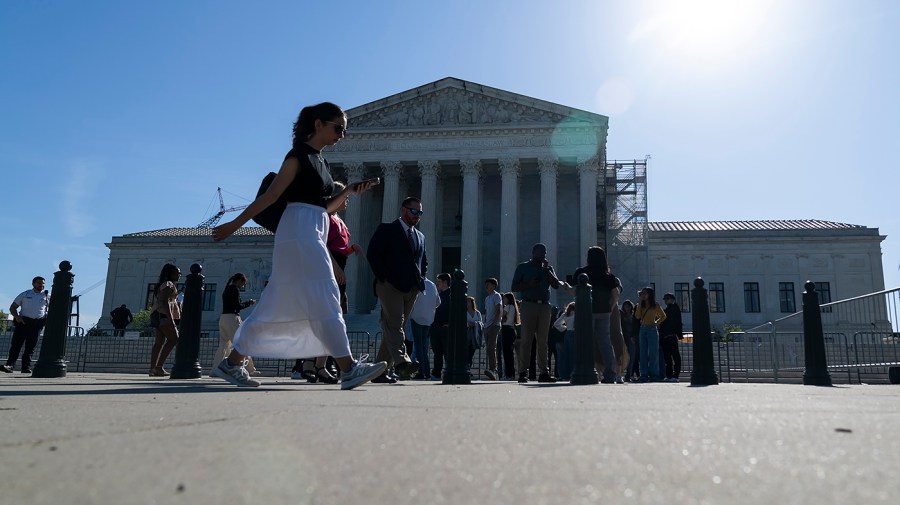
The scope of a federal obstruction law used against scores of Jan. 6 rioters – and former President Trump – drew scrutiny from the Supreme Court on Tuesday, a signal that the justices may be wary of the Justice Department’s far-reaching prosecution of the Capitol attack.
Joseph Fischer, a former police officer accused of storming the Capitol on Jan. 6, 2021, challenged the law in an effort to eliminate one of several counts he faces: obstruction of an official proceeding.
The law, Section 1512(c)(2), makes it a crime to “corruptly” obstruct, impede or interfere with official inquiries and investigations by Congress and carries a maximum penalty of 20 years in prison.
Jeffrey Green, who represented Fischer, argued Tuesday that law was created to more narrowly address acts that affect the “integrity or availability of evidence” — not acts that get in the way of an official proceeding without affecting any evidence.
However, the Justice Department contended that Fischer’s reading imposed an “atextual limit” on the type of conduct that can be prosecuted under the charge, suggesting that Congress meant for the statute to serve as a “classic catchall” for acts not including the destruction of records, documents or other objects.
The charge itself is more than two-decades old, enacted in 2002 after the Enron scandal, where top executives at the energy company were imprisoned for fraud and other offenses after the company went bankrupt.
Since the Capitol riot, more than 1,300 people have faced charges for their role in the attack – some 353 of whom were accused of obstructing Congress’s official count of Electoral College votes that day. The vote certification is the final step of the presidential election process, where in 2020, President Biden’s win over Trump was formalized.
But Fischer and a slew of other Jan. 6 defendants say that the charge has been improperly applied to rioters who descended on the Capitol that day.
The high court’s conservative justices pressed the Justice Department over whether the charge has ever been used to prosecute actions aside from the Capitol attack. U.S. Solicitor General Elizabeth Prelogar said that the DOJ has used the statute in prosecutions involving actions that exposed the existence of a grand jury or an undercover law enforcement officer.
Justice Neil Gorsuch raised hypotheticals like a heckler in the high court’s audience causing a disruption to arguments or the pulling of a fire alarm before votes in Congress, asking if they’d “qualify” for prosecution under the law.
Prelogar purported that if the Justice Department could prove the individual engaging in those acts acted “corruptly” and with “intent,” then those instances would meet the statute’s requirements.
But the solicitor general also zeroed in on the Capitol attack and why the charge maintains importance in those prosecutions.
Justice Brett Kavanaugh inquired as to why Fischer’s other six Jan. 6-related charges aren’t “good enough.” Prelogar replied that Fischer’s “root conduct” revolved around Congress’s certification of the 2020 presidential election and his desire to stop it.
The Justice Department should be able to hold Fischer “accountable for that conduct,” she said.
The justices also probed the specific language of the statute, sticking on the term “otherwise” that separates the first part of Section 1512(c), which is focused on the destruction of records, from the second part, which references any act that “otherwise obstructs, influences or impedes any official proceeding.”
While the Justice Department argued that the latter was meant to encompass any leftover conduct, Fischer claims the law was meant to focus on actual evidence.
“[I]f attempting to influence a congressional committee by itself is a crime, we might as well convert all of Washington’s office buildings into prisons,” Fischer’s lawyer, Frederick Ulrich, wrote in his petition to the high court.
An unlikely ally in his assessment was at one point Biden, who, as a senator, referred to the subsection as “making it a crime for document shredding.” U.S. District Judge Carl Nichols cited Biden’s remark in his ruling tossing out another Jan. 6 defendant’s obstruction charge after finding it did not cover his conduct.
The same judge dismissed the charge in Fischer’s case, though the U.S. Court of Appeals for the District of Columbia Circuit reversed the judge’s decisions in both cases.
The D.C. Circuit – and more than a dozen other Washington district court judges – aligned with the Justice Department’s view of the law.
Several members of the extremist Proud Boys and Oath Keepers groups faced the charge and were convicted, including the leaders of each group, Enrique Tarrio and Stewart Rhodes. Dozens of other defendants with less serious cases have pleaded guilty to the charge or been convicted at trial.
But perhaps most notable is Trump himself, who faces the charge in his federal election interference case being prosecuted in Washington, D.C. Trump’s case did not come up during arguments, but if the Supreme Court sides with the rioters, it would undermine those charges in his and rioters’ cases.
Trump’s D.C. federal case is indefinitely paused as the Supreme Court weighs his presidential immunity challenge, which is scheduled for oral arguments before the high court next week.
The former president is currently on trial in Manhattan over his role in a hush money deal ahead of the 2016 election, and the judge in that case said Monday that he can’t attend oral arguments at the Supreme Court instead of his criminal trial.

